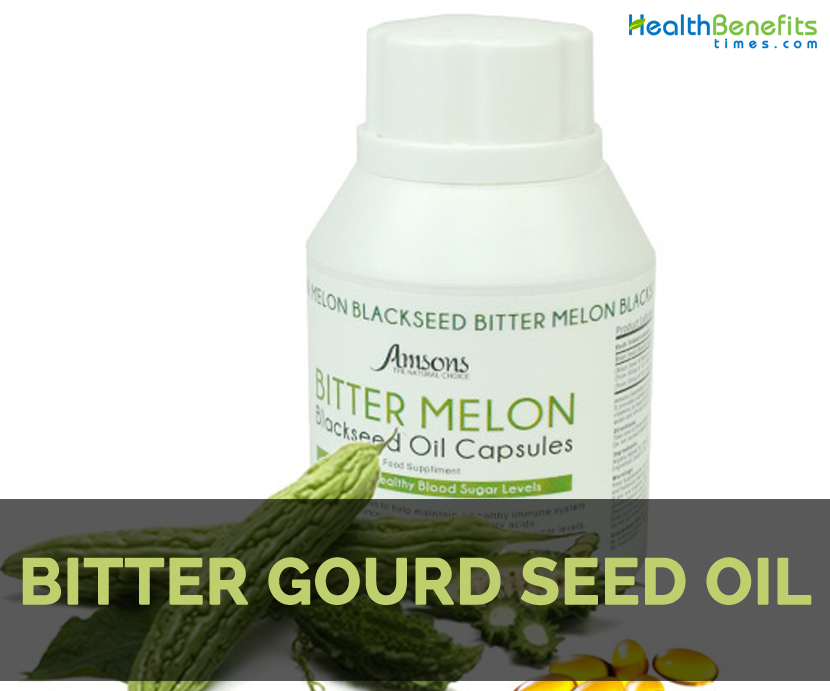| Benefits of Bitter gourd seed oil Quick Facts | |
|---|---|
| Name: | Benefits of Bitter gourd seed oil |
| Scientific Name: | Momordica charantia L. |
| Origin | It was originated in India and was introduced in 14th century in China. It was believed to be brought by slave trade to Brazil from Africa. It is used widely in South Asia, East Asian and Southeast Asian cuisines. |
| Health benefits | Treat atherosclerosis, Diabetes, Cure liver problems, Ulcers, Spleen |
History
It was originated in India and was introduced in 14th century in China. It was believed to be brought by slave trade to Brazil from Africa. It is used widely in South Asia, East Asian and Southeast Asian cuisines.
In Turkey, it is used to soothe stomach, constipation, ulcers, bloating and water retention. In India, this plant is used for Ayurvedic uses to manage the symptoms of diabetes, balance hormones, treat skin disorders, reduce upset digestive health and treat constipation. It acts as a cough suppressant and prevent respiratory ailments.
Currently, Bitter melon is used for cooking purposes in Bangladesh and Asia. It has been used for hundred years to treat various ailments in the countries such as China, Brazil, Cuba, Colombia, India, Haiti, Ghana, Malaya, Mexico, Panama, Nicaragua and Peru. It is added to stir fries in India, China and Japan for boosting digestive health.
Health Benefits of Bitter gourd seed oil
- It is used as a treatment for atherosclerosis and diabetes.
- It is used to cure liver problems, ulcers, spleen, intestinal parasites, high cholesterol, stomachache and heal wounds.
- It is used to treat diabetes, promote menstruation, expel intestinal gas, fever, hepatitis and measles.
- It is used as a treatment for sores and wounds.
- The seeds of Bitter gourd possess anti-HIV-protein that is able to prevent cancer and HIV due to its antitumor and antiviral properties.
- It is also useful to prevent vomiting.
Precautions
- Not to be used by pregnant women because it could promote bleeding and contractions that could lead to miscarriage.
- Consult the doctor by the people having health ailments.
Bitter gourd seed oil facts
| Name | Benefits of Bitter gourd seed oil |
|---|---|
| Scientific Name of Bitter gourd | Momordica charantia L. |
| Native | It was originated in India and was introduced in 14th century in China. It was believed to be brought by slave trade to Brazil from Africa. It is used widely in South Asia, East Asian and Southeast Asian cuisines. |
| Common/English Name | Bitter gourd, karela, Balsam Pear, Squash, bitter melon, melao de sao caetano, papailla, bittergourd, a’jayib almaasi, sorosi, balsam apple, assorossie, balsam pear, ejinrin gule khandan, chin li chih, karela, fu-kua, k’u kua kurela, ku gua, kor-kuey, lai p’u t’ao, salsamino, pava-aki, sorci, sorossie,sorossi, sorossies, peria laut, pare, peria, bitter squash |
| Name in Other Languages of Bitter gourd | Hindi: Karela; English: Bitter gourd; Sanskrit: Karavelli; Marathi: Karli; Gujarati: Karelo; Bangali: korola (করলা|করলা); Kannada: Karali; Malayalam: Kaypa; Tamil: Pakar; Telugu: Kakara; Japan: Goya; Filipino: ampalaya; Germany: Gurkenahnlicher, Balsamapfel; Arabian: Quisaul-barri; Bangladesh: ucche, korola, karala; Cambodia: mreah; Indonesia: paria, pare; Laos: s’aix, haix; Malaysia: peria, periok, peria laut; Philippines: amargoso, paria, ampalaya, palia; Thailand: mara, maha, phakha, ma-ra-kee-nok; Vietnam: kh[oor] qua, m[uw] [ows]p d[aws]ng; Nepali: tite karela (तीते करेला); Sinhala: karavila (කරවිල); Urdu: karela (کریلا); Okinawan: gōyā (ごーやー); |
| Extraction method | Cold pressed |
| Seed | White |
References:
http://www.essentialoil.in/bitter-gourd-oil.html
https://nutrirejournal.biomedcentral.com/articles/10.1186/s41110-016-0013-y
Comments
comments
